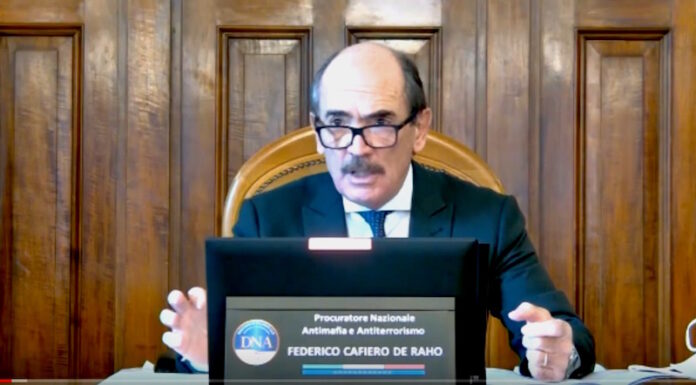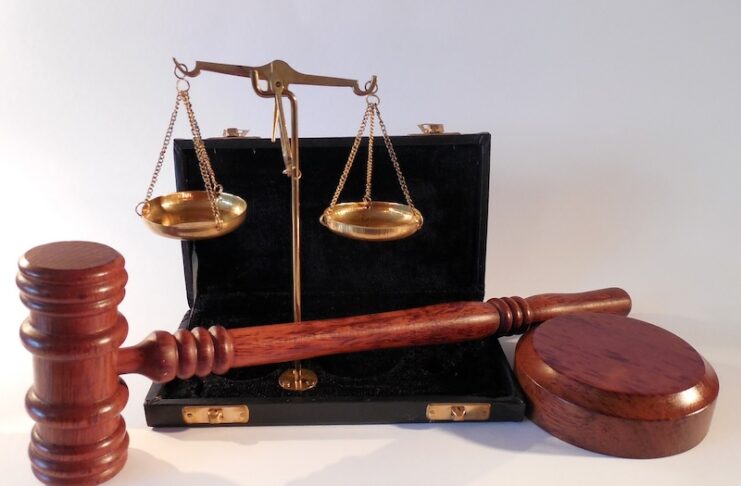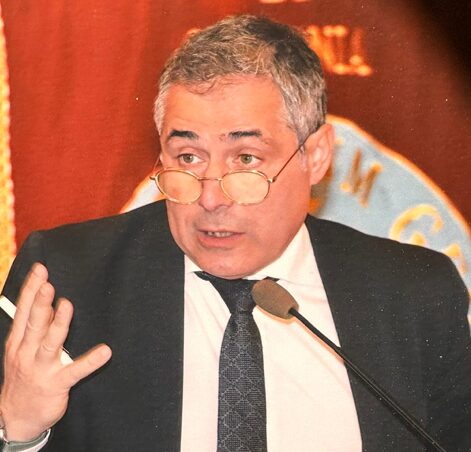For the column “What does mafia mean? – Dialogues on legality” by Sergio Nazzaro hosted on the online magazine of Eurispes.
Are there different mafias, criminal organizations, or are we faced with a single mafia that acts in unison? And how distant are terrorism and mafia? These questions are answered by the experience and knowledge of Federico Cafiero De Raho, National Anti-Mafia Prosecutor, who, after having worked in the fight against the Casalesi Clan, leads the National Anti-Mafia and Anti-Terrorism Directorate after working as Chief for the Reggio Calabria Prosecutor’s Office. Prosecutor Cafiero De Raho has a particular attention towards the issue of confiscated goods, a concrete sign of the State’s response. A dialogue that aims to update the concepts that outline the forms and actions of the mafias and the necessary response of the Institutions that must be able to keep up with the rapid mutations of organized crime and its capacity for global projection.
From your decades of experience in the field, from the courtrooms to the leadership of the National Anti-Mafia Directorate, what peculiar characteristic of the mafias have you seen evolve and what concerns you most? At the same time, how have you seen the state’s response to this ongoing mafia challenge, what innovations do we need?
The mafias began to control their territories of origin through organizations with a military structure, capable of inciting violence, with threats and intimidation. Traditional mafia crimes were represented by usury, extortion, private violence, the most rudimentary forms to impose their presence and power. Since the seventies, the mafias have begun to understand that they needed to develop organized forms for the reinvestment of money generated by illegal activities. Reinvesting criminal proceeds meant structuring themselves on the territory in order to express themselves with their own, contiguous economic subjects. Originally, the mafias made use of relatives, people who had frequent relations with the mafia, and then, even on this front, they found more evolved forms: intermediation, mediation, interfaces capable of camouflaging the criminal origin of capital. The economic and entrepreneurial structure has gone hand in hand with the military one. The latter has operated more and more with indirect forms of coercion: some organizations need only a few words, sometimes even mild and indirect forms of intimidation, so as to make themselves immediately understandable. I remember, for example, Antonio Piromalli when he organizes his own structure in such a way as to ask companies that deal with tourist villages to use his cleaning, service and supply companies. What happens at that moment? The companies immediately understand and accept, only one administrator tries to refuse, because he already has this type of service company and, they (the mafiosi) answer: “Yes, but we are the guarantors of Calabria”. These words are enough to understand what their position is and who they are. At this point, the proposal is immediately accepted. The development of the mafias is, therefore, on the economic front. Using networks of service companies, false invoicing, supplies at discounted prices, activities that allow them to get in touch with other companies and then infiltrate deeper and deeper , aggregate companies that apparently are healthy, and that use false invoicing to improve their profits. This is of deep concern: the pollution of the legal economy. Economic cartels that serve for public procurement, having economic entities that serve to broaden the base to be able to submit different bids. Investigations have shown the ability to manage contracts through a real control room. This means having many companies available, being able to win tenders for contracts and allowing rotation among the different economic entities that participate. Everyone benefits, minus the citizens of course. The modernization of the mafias is completed by reinvesting the capital in weak economic subjects; in those subjects that no longer have access to bank credit, due to the crisis for example. When these subjects come into contact, through intermediaries, with the mafia area, they draw on the mafia’s patrimony and end up becoming subjects controlled by the mafia. Thus, mafias do not need to sign deeds, they do not need documents; on the contrary, they conceal illegal behaviors with the screen of only apparently healthy subjects, thus entering the market of legal economy. This is really worrying. We respond to all this with reports from the territory, from the trade associations themselves, with the reporting of suspicious transactions. The inter-institutional tables are fundamental, such as those that the DNAA has with the Guardia di Finanza, the Customs Agency, and the UIF, different specializations that allow for concrete results because they make different skills and abilities work together.
Your persona has a particular characteristic: on the one hand you highlight the evil produced by mafias, but on the other hand you are always present among the civil society that reacts and I refer to your support to the issue of confiscated goods, especially in the province of Caserta. What does a confiscated property represent for you?
A confiscated property is the clearest demonstration of the steps forward that the State is able to make in the fight against mafias, in the territories that were controlled by organized crime. Above all, it means giving back to civil society what has been taken away from it, the common good of all. The confiscated property is the symbol of the efficiency of the State’s response, the efficiency of the contrast and of the tools we have managed to generate. In addition, it is the clear and evident symbol of the ability of the Judiciary and Law Enforcement in being able to intervene in this fight against mafias by making civil society rich with these goods and impoverishing the mafias. The confiscated goods are the most modern and effective tool in the fight against mafias but, at the same time, they are also a visible symbol of this fight, of the action of the State alongside the citizens. They must be safeguarded and protected, supported, because an abandoned confiscated property is a defeat for legality.
The anti-mafia, a movement of conscience and ideas, a gentle and firm response to the violence of the prevarication of the mafias, is a fundamental element of our democracy. What does it need in order to always be able to move forward and not become self-referential?
The anti-mafia is the feeling of civil society, are the values of our Constitution that make us recognize in the action of the mafias the enemy of freedom, which is the fundamental right, the one from which the ability to self-determine arises. The ability of free economic initiative, too. Anti-mafia is precisely the feeling of the need to react to mafia presences. It is not an anti-mafia movement or movements, it is the feeling of the whole civil society. It is something more important, because it is a thought that interprets the civil feeling that wants to lead the mafias in an ever narrower enclosure until they are annihilated, annulled. When we talk about anti-mafia, it is necessary to respect the commitment of all those who move on this plane, that is, to restore freedom to the territories. It is also true that illegality has emerged in some associations, as in every sector of civil life, but this cannot and must not mortify the common effort. Anti-mafia must be a feeling, a feeling that is present in the State, in the institutions, in young people, in schools where specific training is being carried out. Once upon a time, people asked who the murdered magistrate was and could not give a name, an answer, today all this has changed. Today there is knowledge of history, of the fight against mafias. A deep civil education that is then necessary to move in society and in the observance of its rules. The term “anti-Mafia” is carried within us, like an organ in our body: this serves us to make the best choices, it pushes us to follow the rules, respect for people, the values that our Constitution teaches us. From this point of view, our country is a guide for all European countries.
The map of the mafias is always fluid, compared to those who see them almost immobile in their definitions; from your privileged observatory, what is happening and what transformations are taking place?
The Mafia, the ‘ndrangheta, the Camorra, the Foggia Mafia, the Gargano Mafia, are born in specific territories and then project themselves elsewhere. This is the sign of their strength, constituting their own cells that are cosche, ‘ndrine, clans in other regions of Italy. This is followed by the projection of economic structures that operate throughout the national territory to reinvest and conceal the accumulated capital. Therefore, on the one hand the control of the territory of origin also through the use of force, and on the other hand the control of the economy in the territories that are infiltrated. The qualitative leap is when national borders are crossed, when the projection is at European level and overseas. North America as much as South America: the global projection of mafias becomes clear. A criminal network that has no borders or frontiers. The forms they use are the most advanced in the financial world. Companies set up in countries that do not have stringent legislation to combat organized crime and its infiltration into the economy. They move in territories where the law is weaker. We should speak of “regulatory” paradises, rather than “fiscal” paradises. These are those countries where mafias have a specific ability to bend the rules or circumvent them, exploiting the flaws in international systems. Moreover, the most recent judicial developments make us see that this distinction of cosa nostra, ‘ndrangheta, camorra as different and separate criminal entities hardly corresponds to reality anymore. Examples can be obtained from investigations, from investigative evidences in several occasions: for example, in the cocaine traffic the different organizations operate together pro quota. Similarly in the online gaming sector: the same experts in the sector end up being references for the Mafia, the Camorra and the ‘ndrangheta. The same thing happens in the money laundering sector. A picture of evidence emerges that shows how the various mafias operate together, as a single entity. This tells us that a further step forward is needed; the offices and bodies responsible for combating them must share information and work increasingly in synergy. Increasingly, District Offices need to share knowledge, even at an international level, as do our investigators with other police forces in different countries. Mafias are fought with the widest knowledge, the widest sharing that is proper to all those who operate on the national territory; in this sense, databases are also fundamental.
Since 2015, the Directorate has been responsible for “Dealing with proceedings relating to terrorism, including international terrorism”. How distant, or close, are the worlds of mafias and terrorism and how complex is it to deal with this phenomenon that remains unknown to most people?
In 2015, it was necessary to expand the action of the National Directorate to terrorism in order to adopt the same organizational model that allowed the circulation of information between the District Anti-Terrorism Prosecutors’ Offices. At the same time, investigative liaison and investigative coordination. We wanted to transfer the methodology of the fight against mafias using it in the best way for the fight against terrorism, in the moment of greatest need, when ISIS was moving with great strength and presence also on the European and national territory, through forms of communication on the Net that created aggregation: there was the urgency to operate with an efficient system. This was an important step forward, also because the system in force in the judicial anti-terrorism circuit drew from the system in force in the fight against mafias, the sharing of information. The offices and the District Anti-Terrorism Prosecutor’s Offices, just as the District Anti-Mafia Directorates were already doing, enter into the database the elements of the investigations in progress. This makes it possible to have useful information for fighting both national and international terrorism. Therefore, a model has been applied, that of sharing information and knowledge. With the possibility of intervening with an investigative link between different offices, this model allows us to give immediate answers at an international level. The data collected allow us to respond immediately to requests from other countries, requests on subjects who may have passed through Italy, in-depth analysis of groups and activities in progress. Being able to have an immediate connection with other countries in moments of emergency has had an effective model in the Antimafia model. To say that terrorism and the mafia are two completely different sectors is a circumstance that cannot be affirmed with certainty. Especially when, precisely in these years, in-depth investigations concerning the participation of subjects involved in mafia investigations are also found in facts or contexts of a terrorist nature. Some examples emerge precisely from recent investigations and highlight this. Perhaps, until a few years ago, it could be said that mafia and terrorism were two distinct areas; today, such an affirmation is no longer permitted.






















